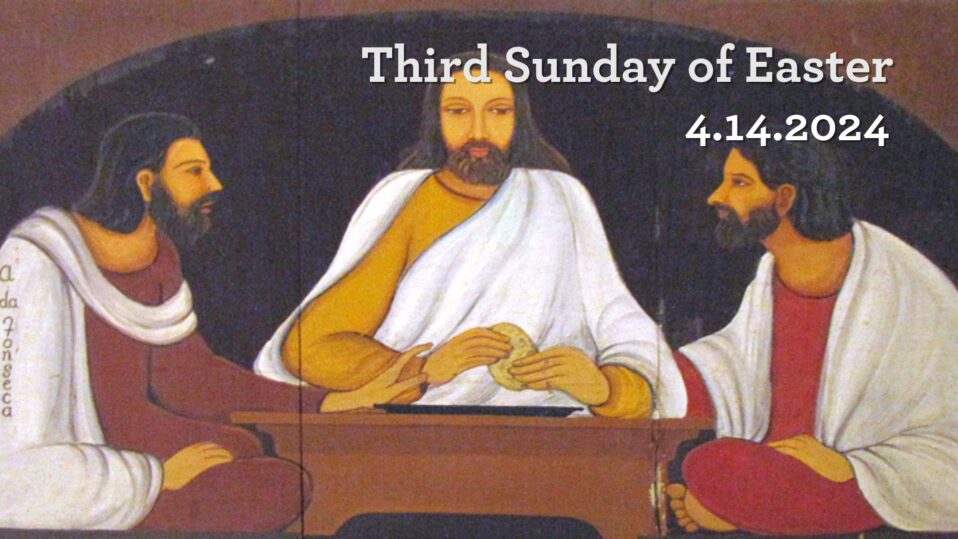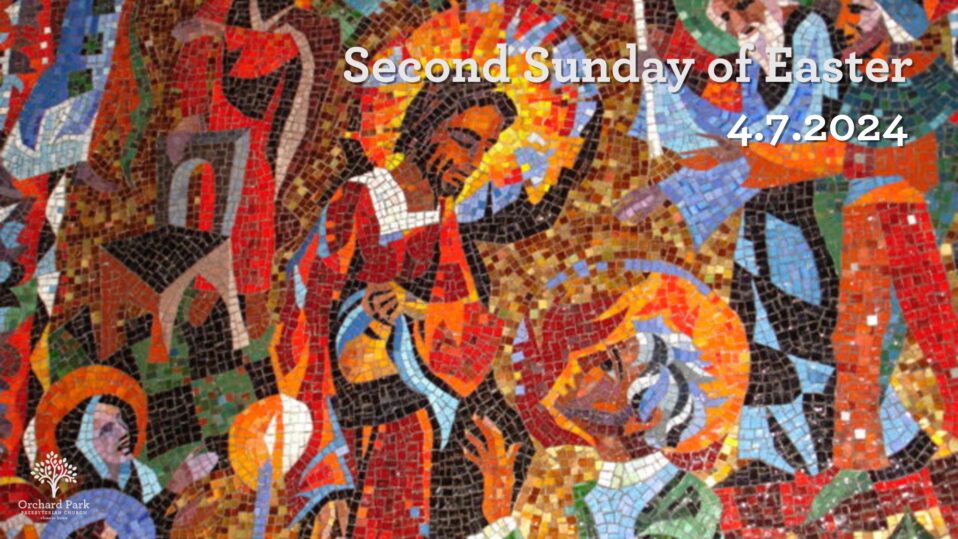Traveling over the holiday season requires faith, patience, and endurance. People know this going in. They know to expect delays, unexpected detours, and small frustrations. Most people who are willing to travel hold some reserves for those challenges. This season was much worse for people traveling, than the normal delays, especially for people traveling Southwest airlines. I was struck by the photographs of the piles and piles of luggage waiting to be claimed in airports.
Every one of those suitcases belonged to someone who was on a journey, trying to get home, or get somewhere so they could get back home. Each suitcase represents a story of a traveler who had to figure out how to get home by another way.
This morning we are telling a familiar story of the three wise men who came from the East to set their eyes on the Christ child and bring him gifts for a king. This story has been retold, extrapolated, and expanded. For example,
The story of the Magi has been retold in T.S. Eliot’s poem, “The Journey of the Magi,” and by Menotti in his opera, “Amahl and the Night Visitors.” Monty Python’s Flying Circus told a version of the story in their movie, “The Life of Brian” – the Magi arrived at Brian’s home first, then took their gifts back when they realized their mistake! And singer-songwriter James Taylor has sung about them in a song, “Home By Another Way,” from which I’ve taken the title of this sermon.
Although the Bible does not say how many Magi there were, the story says they brought three gifts, gold, frankincense and myrrh. It has long been assumed there were three Magi because there were three gifts. By the 5th century of the Common Era they had been given the names Gaspar (or Caspar), Melchior, and Balthasar. Tradition says one of the men was black. All of this is speculative.
This story is full of mystery and fear. king Herod, after all, does not greet the news of a newborn king with joy and gladness, nor does he search for a gift fit to present the messiah. Rather, he is afraid. The Gospel reads: “Wise men from the East came to Jerusalem, asking, ‘Where is the child who has been born king of the Jews? For we observed his star at its rising, and have come to pay him homage.’ When King Herod heard this, he was frightened, and all Jerusalem with him” (Matthew 2:1–3).
King Herod rose to power through military conquest with the backing of Rome—the occupying government. His reign saw many cultural and architectural achievements. And here is the truth: Herod wasn’t necessarily evil. He was relatively popular, even with those in Jerusalem. It was during his reign that Jerusalem saw the building of the great temple so often referenced in our scriptures. He was so popular he earned the title “King of the Jews.”
One thing that’s true about this world: the one thing the powerful seek more than anything else is to remain in power.
Herod is immediately threatened by the mere mention of another—and therefore rival—king. On this Sunday of the Epiphany, we stop short in reading the rest of the story, but Matthew’s Gospel goes on:
Now after the Magi had gone, an angel of the Lord appeared to Joseph in a dream and said, ‘Get up, take the child and his mother, and flee to Egypt, and remain there until I tell you; for Herod is about to search for the child, to destroy him.’ Then Joseph got up, took the child and his mother by night, and fled to Egypt, and remained there until the death of Herod. When Herod saw that he had been tricked by the wise men, he was infuriated, and he sent for and killed all the children in and around Bethlehem who were two years old or under. (Matthew 2:13–16).
This story is sometimes referred to as the Massacre of the Holy Innocents.
Fear is a powerful, haunting thing. In response to his fear, Herod conspires to find the baby Messiah and kill him. In his fear, Herod kills an entire generation in and around Bethlehem. The threat of this newborn king—this baby—was so great that fear overcame him, and acting in that fear, he does the unimaginable.
Fear is a powerful, haunting thing.
Human behavior research has told us that the oppressed—those with their backs against the walls—respond to fear by adopting behavior, ways of life that may protect them. They begin to take caution, and fear becomes a form of life assurance. Fear becomes a way of life. Fear drives every action of the day, every thought of the night. It is a limited, crushing reality.
For the privileged and powerful—those who run the world, call the shots, those who rely on the existence of the oppressed—they respond to fear with even more power, sometimes force. Fear grabs hold to the powerful; a false reality is created, and, using their resources of plenty, they protect themselves at any cost.
Think about it. The world’s hatred and bigotry is rooted in fear. If anything, the past many years has driven home the point. What is fear doing to us?
It would do some good to recognize the Herod in all of us.
We share Herod’s fear of the unknown. We share Herod’s fear of losing power, and we share Herod’s fear of a future that we cannot control or fully understand.
The wisemen could have stayed on the familiar path and gone back the way they came. They could have reported to Herod where the baby was, and changed the course of history. But they did not. They chose a new way home. An unfamiliar path. Maybe a more dangerous path. Maybe a longer route.
That is what happens when you meet Christ in your life, you change and you realize while you can come home again, you come home in a different way, with a different perspective, with new understanding of who you are.
Here is my question for you to ponder this fresh new year day, if our true home is with being in communion with God, what do you need to change to get closer to Him? What do you need to do differently in your life to get home and what are you afraid of that keeps you going back to Herod?
If we keep trotting the same path and expecting different results, we will drive ourselves insane. But if we go home another way, by resolving to set aside resentment, by refusing to go back to the old hurt that you keep hanging onto like a dog with a bone. Refuse to go back to the anger you keep revisiting again and again and again. Let it go.
Go home another way by not being reactive, but rather by being responsive. Sit still in anxiety and let the moment pass and then see what is in front of you. Our minds are anxious. You can be gentle with your anxiety and chose not let it overwhelm you.
Go home another way by making a commitment to take care of your body. We only get one. Not feeding it enough or with the right food, abusing it with alcohol or drugs, not resting it. You can care for yourself in a new way.
Go home another way by resolving to be kind. The Jesuit priest James Martin wrote in the latest issue of National Catholic Review: Be a little kinder. I think that 90% of the spiritual life is being a kind person. No need to have any advanced degrees in theology or moral reasoning, and no need to have an encyclopedic knowledge of the world’s religious traditions, to get this: Be gentler and more compassionate towards other people. In other words, say “Thank you” and “Please.” Ask people how they are. Listen more carefully when they speak to you. Be kind.
Go home another way by not returning to the Herod that would enable abuse or mistreatment of others. Go back another way by not cooperating with whatever would put those who are vulnerable at risk. Speak out about it. Doing nothing to speak out against injustice is doing something. “The opposite of love is not hate, it’s indifference. The opposite of art is not ugliness, it’s indifference. The opposite of faith is not heresy, it’s indifference. And the opposite of life is not death, it’s indifference.” “Be still when you have nothing to say; when genuine passion moves you, say what you’ve got to say, and say it hot.”
As we box up our nativity scenes and ornaments for another year, what new direction will take? Will we live the same as we have in the past, or will be changed by proclamation that God is with us?
The turning of the year
Is a time to look forward,
While holding on
To those moments in the year past
When we suddenly became aware
Of God with us.
We waste time if we look back in anger or regret,
Or forward in fear.
Though these days are short,
They can dazzle with their brightness.
Epiphany, a season of clear-seeing:
Life in perspective, with all its possibilities,
Before the diary fills up
An unwritten page; a door opening;
A field of snow untrodden.
God of dreams and discoveries,
At this turning point in our lives
May your epiphany open our eyes:
May we be wise enough
To become fools for Christ’s sake,
And as we step into another year
Of our journey home to you,
May we find courage to go a different way. Amen.
Amen,
Rev. Dr. Shelly Wood



